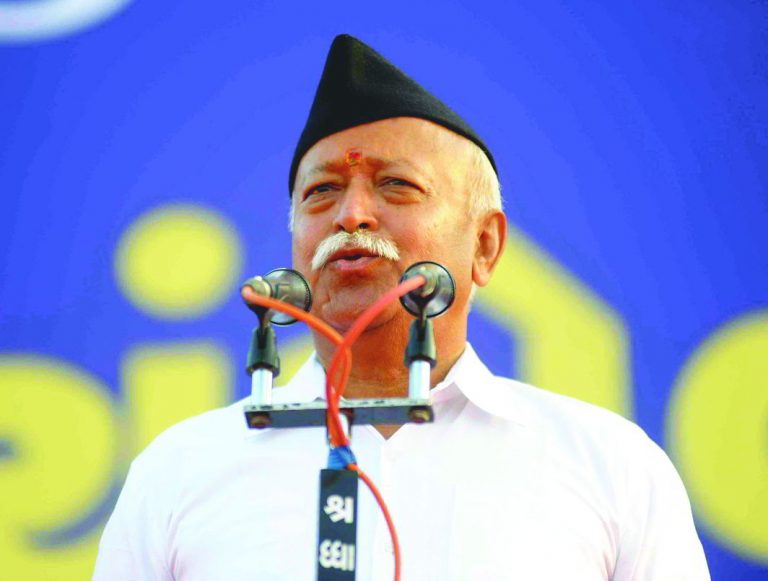
Above: RSS strongman Mohan Bhagwat. Photo: UNI
RSS leaders have of late been demanding a review of the Constitution but what is the motive and where does that leave the Justice Venkatachaliah Commission Report?
~By Chandrani Banerjee
Speaking recently at the silver jubilee celebrations of the Akhil Bharatiya Adhivakta Parishad (All India Advocates Council) in Hyderabad, RSS strongman Mohan Bhagwat dropped a bombshell. The essence of his speech called for a review of the working of the Constitution. This may not be new—the RSS has made similar demands in the past—but now it seems that a definite plan is in the works. The use of a lawyer’s conference to propagate the idea suggests that testing it before an audience of law makers is the precursor to a more forceful push. In fact, Bhagwat’s speech spelled out what sort of a review they wanted by speaking about how Indian culture and tradition had a lot to offer and suggested that law makers can look at them while planning a review. The unsaid addendum was that Indian culture essentially meant Hindu culture. That is also in line with the Modi government’s push for a Uniform Civil Code.
Speaking to India Legal, RSS Pracharak Manmohan Vaidya says: “In our ancient civilisation the Code had been reviewed and reframed suitable to the changing times and situations. Now after 70 years of Independence, the experts should review the provisions accordingly, so that people can be educated about law. This will help increasing the ease of enforcement of the law.”
RSS functionaries, however, downplay any deeper motives. One senior RSS leader told India Legal: “In 70 years we have changed a lot. India is known for its culture and traditions. A holistic world-view needs to be reflected in the Constitution.’’ That was, in fact, the reason why the then prime minister Atal Behari Vajpayee was provoked to constitute an 11-member National Commission to review the working of the Constitution on the grounds that much had changed in India in 50 years. The Justice Manepalli Narayana Rao Venkatachaliah Commission was set up to in 2000 to suggest possible amendments to the Constitution of India.
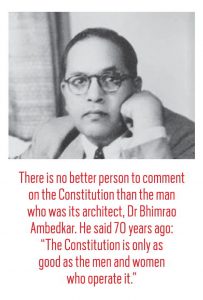 Headed by the former Chief Justice of India, the other members were prominent individuals with credibility and proven experience. They included BP Jeevan Reddy (Chairman of the Law Commission), RS Sarkaria (former judge of the Supreme Court), K Punnayya (former judge of Andhra Pradesh High Court), Soli Sorabjee (Attorney-General of India), K Parasaran (former Attorney-General of India), Subhash C Kashyap (former Secretary-General of Lok Sabha), CR Irani (Chief Editor & Managing Director of The Statesman), Abid Hussain (former ambassador to the USA), Sumitra Kulkarni (former Member of Parliament) and PA Sangma (former speaker of Lok Sabha). The setting up of the Commission triggered opposition from other political parties and the civil society as a whole. The criticism revolved around the fact that the Commission lacked the legitimacy to perform the review because it neither had the parliament’s sanction nor was political consensus in its favour with regards to its terms of reference and composition.
Headed by the former Chief Justice of India, the other members were prominent individuals with credibility and proven experience. They included BP Jeevan Reddy (Chairman of the Law Commission), RS Sarkaria (former judge of the Supreme Court), K Punnayya (former judge of Andhra Pradesh High Court), Soli Sorabjee (Attorney-General of India), K Parasaran (former Attorney-General of India), Subhash C Kashyap (former Secretary-General of Lok Sabha), CR Irani (Chief Editor & Managing Director of The Statesman), Abid Hussain (former ambassador to the USA), Sumitra Kulkarni (former Member of Parliament) and PA Sangma (former speaker of Lok Sabha). The setting up of the Commission triggered opposition from other political parties and the civil society as a whole. The criticism revolved around the fact that the Commission lacked the legitimacy to perform the review because it neither had the parliament’s sanction nor was political consensus in its favour with regards to its terms of reference and composition.
The parallel with the current situation is glaringly obvious. The main opposition to the Justice Venkatachaliah Commission was that it smacked of ulterior motives on the part of the government. There was a fear that it sought to effect changes in the Constitution to serve its own interests. The fear was that there could be attempts to tamper with the avowed concept of secularism, one of the basic features of the Constitution, or that it would entail an overhaul rather than a review of the Constitution. Speaking to India Legal from Bangalore, Justice Venkatachaliah suggests that his Commission’s role was more in the nature of a trail balloon. “They (the Commission’s recommendations) were never meant to be put in place. The committee made recommendations and also shared observations. Sadly, it was restricted to that.’’ Another prominent member, Dr Subhash Kashyap, told India Legal: “I do not want to comment about the political angle behind this demand. However, I would want to say that very useful recommendations were made by the Commission which would benefit citizens. They should not gather dust. They are implementable and they should be implemented.”
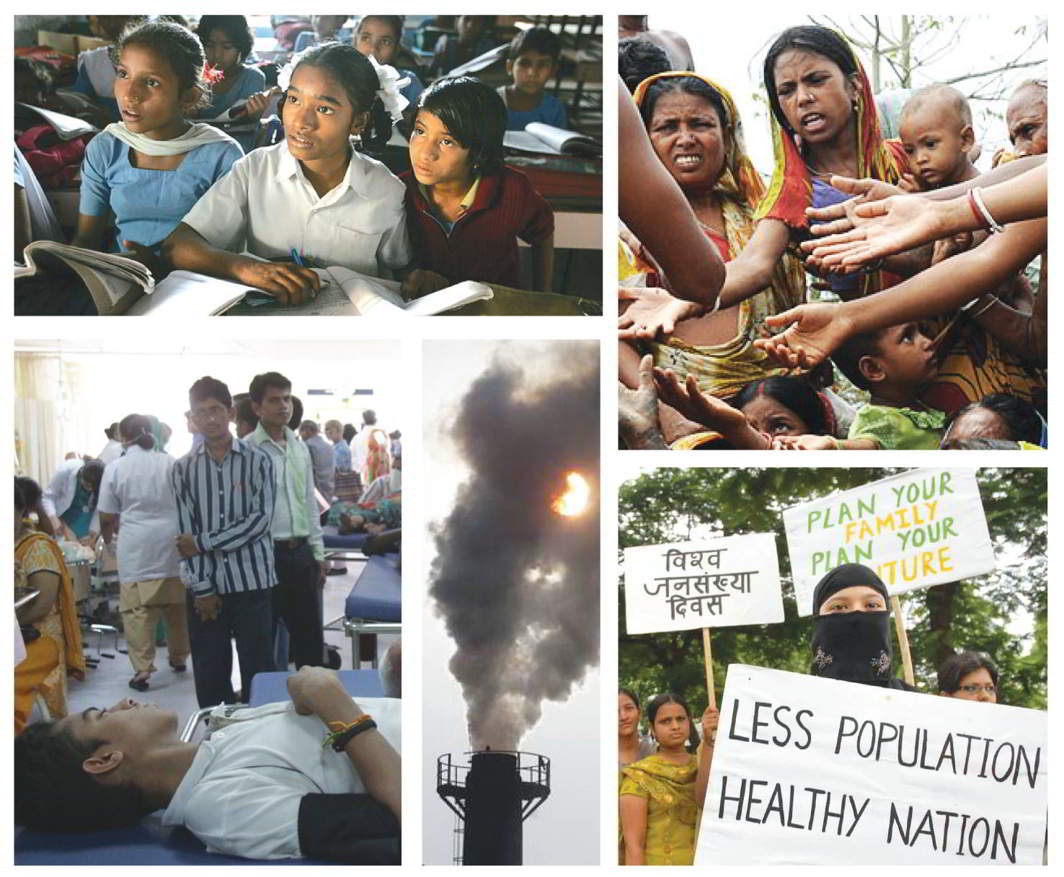
The Commission submitted its report to then Union minister for law and justice Arun Jaitley on March 31, 2002 in New Delhi. Kashyap revealed, the actual time spent on the task was three months. The Commission held 16 meetings, and did a lot of background work. It collected material and obtained suggestions from the public and interested groups. The Commission agreed that a Constitution, however lofty its exhortations and sentiments, is not a self-executing document; it requires the aid of a human agency to implement its provisions. “The political traditions of the people and the spirit of constitutionalism are what make a Constitution work. Its essence is its practice,” the Commission said.
The Commission came up with a total of 249 recommendations. These included:
- The heading of Part IV of the Constitution should be amended to read as “Directive Principles of State Policy and Action”. Under this head should come the rights of work, social security, health, education, food, freedom from hunger, shelter and clothing.
- A special Article is needed to be incorporated for population control. “The State shall endeavour to secure control of population by means of education and implementation of small family norms.”
- The State will be under the duty of promotion of inter-religious harmony and inter-faith values by setting up of “mohalla committees” with the participation of prominent members of different communities to take note of early warning symptoms and alerting the administration in preventing them.
- It is necessary to separate religious percepts from civil law.
- Every person must have the right of safe drinking water and of an environment that is not harmful to one’s health or well-being.
- Right to information should be guaranteed and needs to be given real substance.
The main opposition to the Justice Venkatachaliah Commission was that it smacked of ulterior motives on the part of the government.
Justice Venkatachaliah maintains his position that the Commission was intended as an academic exercise. Making no claims to legitimacy at all, the Commission has left it to parliament and the States to decide which of its recommendations are implementable. Of the 249 recommendations that the Commission made, 58 involve amendments to the Constitution, 86 involve legislative measures and the rest involve executive action. Four members of the Commission, Justice BP Jeevan Reddy, Subhash Kashyap, CR Irani and Sumitra G Kulkarni, appended separate notes to the report. The existence of that report puts a question-mark over why the RSS is demanding a review now. It would suggest that the recommendations made by the Commission are not really in tune with the changes the Sangh would like to see. A top RSS functionary said: “Mohan Bhagwaatji has put forward an idea before the legal fraternity and now it is up to them to take it forward. If they want to do something about it. they (the legal fraternity) will do it. Our job is to draw the attention towards the need. We have done it.”
“We are a low energy democracy”
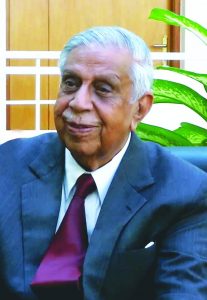 Justice MN Venkatachaliah, the 25th Chief Justice of India, headed the National Commission to review the working of the Constitution from 2000 to 2002. He made significant recommendations and the report was submitted in 2002. However, though the recommendations were considered, they were not implemented. Speaking to Chandrani Banerjee from Bangalore, Justice Venkatachaliah said that reviewing the Constitution was a serious subject and should be taken seriously.
Justice MN Venkatachaliah, the 25th Chief Justice of India, headed the National Commission to review the working of the Constitution from 2000 to 2002. He made significant recommendations and the report was submitted in 2002. However, though the recommendations were considered, they were not implemented. Speaking to Chandrani Banerjee from Bangalore, Justice Venkatachaliah said that reviewing the Constitution was a serious subject and should be taken seriously.
Over the past 15 days, RSS chief Mohan Bhagwat has said that there should be a review of the working of the Constitution. What is your opinion?
I don’t want to comment on a political or organisational viewpoint.
Do you think there is a need to review the working of the Constitution?
Yes, as a member of the judiciary, I would say there is a need for it. It is an issue that needs to be considered with the utmost seriousness.
You headed a committee that made recommendations in 2002 on this subject. Why were those recommendations not put in place?
They were never meant to be put in place. The committee made the recommendations and also shared its observations. Sadly, it was restricted to that.
What are the reasons it never shaped up the way the Justice Chaliah Committee perceived it?
See, we are a low-energy democracy. And there is difference between a low-energy democracy and a high-energy democracy. Secondly, the legitimacy of our election system is not above average. So, we are only good at making a façade of democracy. There is no equality anywhere in the country. There are problems in every system and there is no will to correct it.
What is the roadmap for an improved democracy?
Either we have democracy or concentrated wealth in the hands of a few. We cannot have both. Currently, one percent of people in India own 60 percent of wealth. Clearly, there is a problem and we cannot figure it out. The growing economy is also a made-up concept and is just a façade. Actually, black money is in use. Clean money is not in circulation. Nothing much can be done to solve this problem.
Where are we failing in the whole process?
A system has not been made in this democracy. A system that can help and support a healthy democracy should be put in place. It is not that nothing good has happened so far, but the lack of a system has damaged us.
Should we take a lead from your recommendations?
My review is old and obsolete. When the US completed 200 years of its constitution, it invited eminent lawyers, teachers, thinkers, doctors and professionals from every field to sit and analyse the working of the Constitution. Those who participated were critical, and gave an honest and open view. We need to be frank and open too. It is a serious subject. The problem in our country is that serious things are not taken seriously.
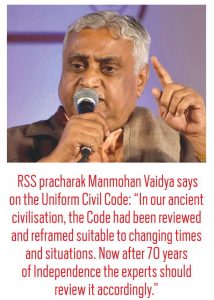 The legal fraternity is fine with a review but with certain conditions. Says Supreme Court lawyer Abani Sahu: “While there is an unsaid fear about the constant mention by the RSS about the review of the working of Constitution, I would say if a review is needed then we should hear the views of the public. Invite people to send suggestions and express their fears. People’s participation and their views should be taken into consideration without following any political ideology.” In fact, it was Jawaharlal Nehru who observed in the Constituent Assembly on November 8, 1948: “While we want this Constitution to be as solid and as permanent a structure as we can make it, nevertheless there is no permanence in Constitutions. There should be a certain flexibility. If you make anything rigid and permanent, you stop a nation’s growth, the growth of a living, vital, organic people…. we should not make a Constitution, such as some other great countries have, which are so rigid that they do not and cannot be adapted easily to changing conditions. Today especially, when the world is in turmoil and we are passing through a very swift period of transition, what we may do today may not be wholly applicable tomorrow.”
The legal fraternity is fine with a review but with certain conditions. Says Supreme Court lawyer Abani Sahu: “While there is an unsaid fear about the constant mention by the RSS about the review of the working of Constitution, I would say if a review is needed then we should hear the views of the public. Invite people to send suggestions and express their fears. People’s participation and their views should be taken into consideration without following any political ideology.” In fact, it was Jawaharlal Nehru who observed in the Constituent Assembly on November 8, 1948: “While we want this Constitution to be as solid and as permanent a structure as we can make it, nevertheless there is no permanence in Constitutions. There should be a certain flexibility. If you make anything rigid and permanent, you stop a nation’s growth, the growth of a living, vital, organic people…. we should not make a Constitution, such as some other great countries have, which are so rigid that they do not and cannot be adapted easily to changing conditions. Today especially, when the world is in turmoil and we are passing through a very swift period of transition, what we may do today may not be wholly applicable tomorrow.”
Prophetic words, considering the turmoil and swift periods of transition almost 70 years later. Moreover, any review of the Constitution at this stage will meet with the same resistance from the Opposition that the Justice Venkatachaliah Commission did when it was set up under the first BJP-led government. It may be just a coincidence that the current demand from the RSS comes when there is once again a BJP-led government at the Centre, but the kind of majority the Modi government enjoys gives the question of a constitutional review a sharper edge. Opinions differ as to whether the resurfacing of the demand is really an effort to push a certain ideology. Justice Venkatachaliah himself agrees that a review of the working of the Constitution is needed but not for any ideological reasons—he says his recommendations are now old and obsolete, although his definition of India’s democratic credentials are interesting.
“We are a low energy democracy. And there is difference between a low energy democracy and a high energy democracy. There is no equality anywhere in the country. There is problem in every system and there is no will for correcting it,” he says.
The difference lies in the current political atmosphere where Hinduism and the Hindu way of life has assumed centrestage.
In this kind of surcharged atmosphere, a demand for reviewing the Constitution acquires added importance. There is, in fact, no better person to comment on the Constitution than the man who was its architect, BR Ambedkar. As he said 70 years ago: “The Constitution is only as good as the men and women who operate it.”

